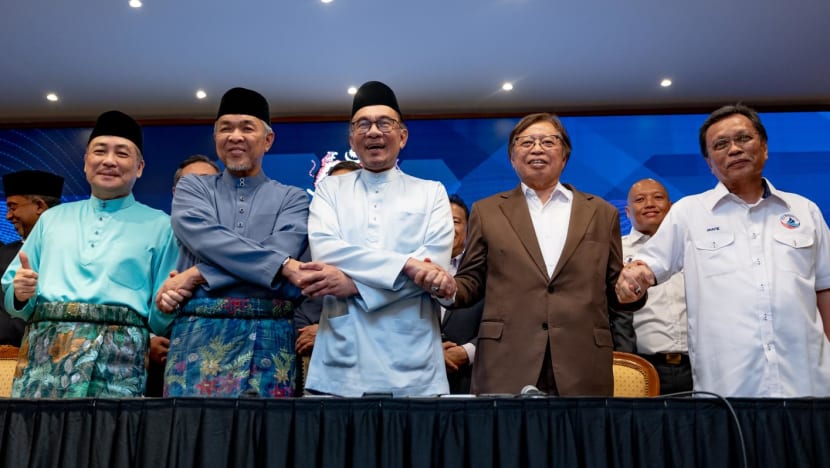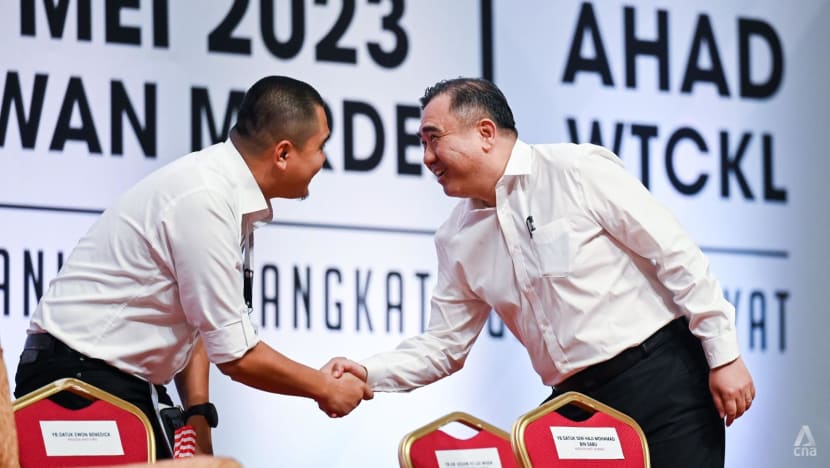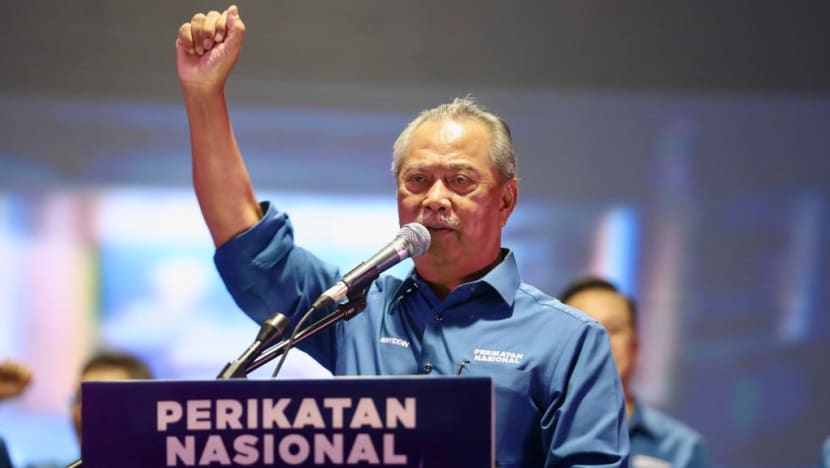
Malaysia by-election threatens to be racially polarised, could hurt government’s moral, political legitimacy: Analysts
Voters in Selangor’s Kuala Kubu Bharu could abstain or vote for the opposition to show dissatisfaction with how the unity government has handled issues of race and livelihood, analysts say.
Voters in Selangor’s Kuala Kubu Bharu could abstain or vote for the opposition to show dissatisfaction with how the unity government has handled issues of race and livelihood, analysts say.

A street in Kuala Kubu Bharu, Selangor. (Photo: Google street view)

Aqil Haziq Mahmud@AqilHaziqCNA
28 Apr 2024
KUALA LUMPUR: A state by-election in the semi-urban town of Kuala Kubu Bharu in Selangor set for May 11 is shaping up to be a test of the dynamics between different factions in the unity government, analysts said.
Recent events - such as the controversial KK Super Mart socks saga as well as the latest twist in former premier Najib Razak’s bid to get out of jail - could exacerbate the existing animosity between Barisan Nasional (BN) and the Pakatan Harapan (PH) coalition led by Prime Minister Anwar Ibrahim, analysts said, making it more difficult for BN supporters to vote for the government’s candidate.
This will be the seventh by-election to be held in Malaysia after the 15th general election in November 2022.
Following Nomination Day on Saturday (Apr 27), it will be a four-cornered fight, with PH represented by Democratic Action Party (DAP) candidate Pang Sock Tao and the opposition Perikatan Nasional (PN) fielding Parti Pribumi Bersatu Malaysia (Bersatu) Hulu Selangor division chief Khairul Azhari Saut.
Parti Rakyat Malaysia nominated Ms Hafizah Zainuddin, and Ms Nyau Ke Xin is running as an independent. Another independent candidate Chng Boon Lai had earlier filed for nomination but was disqualified for having incomplete documents, the Star reported.
The seat had been held by DAP assemblyman Lee Kee Hiong since 2013 before her death on Mar 21 after a battle with cancer.
While observers said a unity government loss in this by-election will not impact its stability in governing both Selangor and the nation, it is a wider signal that Malaysians are unhappy with how bread-and-butter issues like rising cost of living are being handled.
The observers added that a poor result for the unity government would also mean PH and BN might be forced to abandon any thoughts of forming a “super-coalition” at the next general election, due to be held by February 2027.
In recent weeks, events involving members of the United Malays National Organisation (UMNO) - the once-dominant Malay-based party leading BN - have threatened to sow further discord in its already tenuous relationship with PH.
UMNO youth chief Akmal Saleh has emerged as one of the most vocal critics of the KK Super Mart socks saga, despite the government’s insistence that the incident not be politicised.
The incident - where socks bearing the word “Allah” were purportedly sold at several outlets of the homegrown convenience store chain - also drew a sharp rebuke from Malaysian king Sultan Ibrahim Sultan Iskandar.
More recently, UMNO president Ahmad Zahid Hamidi - who is also Deputy Prime Minister - filed an affidavit on Apr 17 to support Najib’s bid to compel the government to produce a supposed royal order that allows him to serve the remainder of his sentence at home.
Related:

‘Allah’ socks and shoes: Malaysia needs to put foot down on stamping out violent religious conservatism, say analysts

New twist in Najib’s bid to serve jail term at home as two ministers dispute claims over supposed royal order
Already, BN component parties such as the Malaysian Chinese Association (MCA) and Malaysian Indian Congress (MIC) previously said they will not campaign in the by-election if the government’s candidate is not from BN.
Both Mr Anwar and Mr Ahmad Zahid have come out to dismiss these suggestions.
While MIC seems to have softened its no-campaign stance, MCA has held firm, citing what it perceives as insults from members of the Democratic Action Party (DAP) - a component party of PH.
For instance, MCA has hit out at claims by DAP secretary-general Anthony Loke - who is also the Transport Minister - that the Chinese-based party MCA had the image of not prioritising the needs of the people, especially the Chinese community.
Political analyst Sivamurugan Pandian at Universiti Sains Malaysia said the by-election will test DAP’s relationship with UMNO, in terms of how far the latter can convince its supporters to vote for the government’s candidate.
“I think this election will also be a litmus test for the unity government to show that the collaboration does not exist only at the top level, but also at the grassroots level,” he told CNA.

Malaysian Prime Minister Anwar Ibrahim (centre) with other political coalition leaders after the signing of the memorandum of understanding on the unity government on Dec 16, 2022. (Photo: Prime Minister’s Office of Malaysia/Afiq Hambali)
Professor James Chin from the University of Tasmania said it will be difficult for UMNO to ask Malays - who now form the majority of Kuala Kubu Bharu’s voters - to support the government’s candidate.
Fifty per cent of voters in the constituency now are Malay, 30 per cent are Chinese, and 18 per cent are Indian.
“If the candidate is from DAP, UMNO will have some problems, especially after Akmal’s quarrels with Nga Kor Ming,” Prof Chin said, referring to how the DAP vice-chairman - who is also the Housing and Local Government Minister - had traded barbs with Dr Akmal over the socks issue.
“A lot of (whether Malay voters will support the government candidate) will depend on how aggressively UMNO will be campaigning among the Malay community.”
Ms Pang is also the current press secretary of Mr Nga, who stirred controversy by suggesting in February that Selangor’s Chinese new villages be nominated as a UNESCO World Heritage site.
UMNO’s Malay nationalists slammed the idea, which was also criticised by some quarters for evoking painful memories of exploitation during the country’s colonial era.
In a commentary published by Free Malaysia Today, Kua Kia Soong, an academic and former MP, wrote that the nomination was an “insult” to those who fought colonial power.
Between 1948 to 1960, the British colonial administration - purportedly fighting the anti-colonial movement - forcibly relocated Chinese Malaysians into tightly monitored settlements with inhumane living conditions. These settlements include the Chinese new villages.
Plans for the UNESCO nomination were subsequently abandoned.
Professor James Chin from the University of Tasmania said it will be difficult for UMNO to ask Malays - who now form the majority of Kuala Kubu Bharu’s voters - to support the government’s candidate.
Fifty per cent of voters in the constituency now are Malay, 30 per cent are Chinese, and 18 per cent are Indian.
“If the candidate is from DAP, UMNO will have some problems, especially after Akmal’s quarrels with Nga Kor Ming,” Prof Chin said, referring to how the DAP vice-chairman - who is also the Housing and Local Government Minister - had traded barbs with Dr Akmal over the socks issue.
“A lot of (whether Malay voters will support the government candidate) will depend on how aggressively UMNO will be campaigning among the Malay community.”
Ms Pang is also the current press secretary of Mr Nga, who stirred controversy by suggesting in February that Selangor’s Chinese new villages be nominated as a UNESCO World Heritage site.
UMNO’s Malay nationalists slammed the idea, which was also criticised by some quarters for evoking painful memories of exploitation during the country’s colonial era.
In a commentary published by Free Malaysia Today, Kua Kia Soong, an academic and former MP, wrote that the nomination was an “insult” to those who fought colonial power.
Between 1948 to 1960, the British colonial administration - purportedly fighting the anti-colonial movement - forcibly relocated Chinese Malaysians into tightly monitored settlements with inhumane living conditions. These settlements include the Chinese new villages.
Plans for the UNESCO nomination were subsequently abandoned.
ERODING NON-MALAY SUPPORT FOR UNITY GOVERNMENT
The government’s problems could be further compounded by decreasing support from the non-Malay community, which forms half of voters in Kuala Kubu Bharu.
Already, certain quarters had called for Indian voters in the constituency to not support the PH candidate, citing dissatisfaction with the unity government’s treatment of the Indian community. Mr Anwar has defended his treatment of Malaysian Indians.
Beyond that, political scientist Wong Chin Huat from Sunway University believes the socks issue has soured DAP and UMNO's relationship to the point that UMNO will not campaign for DAP.
“Or if UMNO does, the campaign would be ineffective (to rally support from) Malay voters and off-putting for the non-Malays,” he told CNA.
“Those (UMNO members) who do (campaign) would be seen as soft towards DAP. At the same time, DAP's self-restraint on the KK Super Mart issue and (on the) Najib (issue) has made its base feeling lost, and questioning if their once vocal party has morphed into the new MCA.”
Related:

Analysis: Charm offensive for support, defence against defections — it’s total politics for Malaysia PM Anwar after dismal state polls

Commentary: Malaysia’s state elections - when referendum takes precedence over reformasi
Dr Ong Kian Ming, director of the philosophy, politics and economic programme at Taylor's University, said in a statement that it would “not be inaccurate” to say DAP and PH supporters have been disappointed by the unity government’s performance.
This includes areas like the slow pace of delivering institutional reform, the weak economic narrative involving rising cost of living, and the public spats between some PH and BN leaders, especially in the recent weeks over the KK Super Mart issue.
“These factors mean that the turnout among non-Malay voters is likely to reduce noticeably in this by-election especially since the results won’t affect the stability of the Selangor state government,” he said.
PAKATAN HARAPAN TO SCRAPE THROUGH?
While Dr Ong said non-Malay support for DAP is likely to remain significant, “any small drops in the non-Malay turnout and support will have a noticeable effect on the final result”.
If DAP manages to minimise non-Malay turnout and maintain overall turnout at 58 per cent - overall turnout in Kuala Kubu Bharu during the Selangor state election last year was 68 per cent - Dr Ong expects it to scrape through by winning with a less than 1,000-vote majority.
At the last state election in August, the incumbent Ms Lee was re-elected with a majority of 4,119 votes in a three-way contest.
But if overall turnout drops to 54 per cent, alongside a slight drop in support for DAP across racial groups, the party could lose the by-election by almost 2,000 votes, Dr Ong warned.
He also said that he expects PN to use issues like the KK Super Mart socks saga and Mr Ahmad Zahid’s affidavit to attack the unity government.
PN component party Gerakan will likely attack DAP's relative silence on the socks issue, as well as the unity government and UMNO’s inability to control Dr Akmal, he said, while Bersatu is more likely to attack the government for not being united and Mr Anwar for being inconsistent on fighting corruption.

A file photo of DAP chief Anthony Loke (right) attending the Unity Government National Convention at World Trade Centre Kuala Lumpur. (Photo: CNA/Fadza Ishak)
With PH and PN fielding a Chinese and Malay candidate respectively, Dr Ong fears that the hustings could become “racially polarising” as both coalitions try to appeal to the candidates’ racial groups.
“Hopefully, there will be a push towards the ‘middle’ on all sides to show that both coalitions can campaign using inclusive and progressive messages especially in terms of what they can deliver to the voters of Kuala Kubu Bharu,” he added.
Ultimately, PN chairman Muhyiddin Yassin has framed the by-election as a referendum of the unity government on the promises it made during the last general election.
“It is the people’s sentiments which overwrites the issue of race,” local media reported him as saying, as he criticised government policies like subsidy rationalisation that purportedly had led to an increase in the costs of living.
With PH and PN fielding a Chinese and Malay candidate respectively, Dr Ong fears that the hustings could become “racially polarising” as both coalitions try to appeal to the candidates’ racial groups.
“Hopefully, there will be a push towards the ‘middle’ on all sides to show that both coalitions can campaign using inclusive and progressive messages especially in terms of what they can deliver to the voters of Kuala Kubu Bharu,” he added.
Ultimately, PN chairman Muhyiddin Yassin has framed the by-election as a referendum of the unity government on the promises it made during the last general election.
“It is the people’s sentiments which overwrites the issue of race,” local media reported him as saying, as he criticised government policies like subsidy rationalisation that purportedly had led to an increase in the costs of living.
ANWAR COULD LEARN “WRONG LESSONS” IF OPPOSITION WINS
While a PN win in Kuala Kubu Bharu will not affect the stability of the state or federal government, Dr Ong said this possibility could make Mr Anwar and the unity government take away the “wrong lessons”.
This includes being fearful of taking a more proactive and progressive stance on sensitive issues like race and religion, and adopting even more short-term policy solutions like postponing the rollout of targeted subsidies, he said.
Dr Sivamurugan said the by-election will test the state government’s moral and political legitimacy, and that a PH loss with a high Malay voter turnout will force the government to revisit how it handles issues of livelihood as well as race and religion.
“It is not just a by-election. I think with a lot of issues around the corner, they (PH) have to make sure that they are able to retain the seat,” he added.
“If PN wins this seat, I think it’s a message or signal from voters that they want the government to buck up on issues related to the masses.”

Former Malaysian prime minister and Perikatan Nasional (PN) chairman Muhyiddin Yassin at a coalition event on Jun 24, 2023. (Photo: Facebook/Muhyiddin Yassin)
If PH loses due to a low turnout, the coalition will be “alarmed and pressured” to be more assertive in its relationship with BN moving into the next general election two or three years away, Professor Wong from Sunway University said.
DAP and UMNO have been non-committal in recent statements on their extent of cooperation at the next general election and beyond, Free Malaysia Today reported.
Mr Loke had expressed hope that the PH-BN cooperation would continue beyond the next general election.
Mr Ahmad Zahid had expressed confidence that the unity government would continue to govern even after the next general election, provided that component parties continue to uphold sincerity, consensus and transparent negotiations.
“Without breaking the government, DAP and PH will bury the thought of having a super-coalition with UMNO,” Prof Wong said, adding that both coalitions could be forced to think through and manage competing interests ahead of the national polls.
If PH loses due to a low turnout, the coalition will be “alarmed and pressured” to be more assertive in its relationship with BN moving into the next general election two or three years away, Professor Wong from Sunway University said.
DAP and UMNO have been non-committal in recent statements on their extent of cooperation at the next general election and beyond, Free Malaysia Today reported.
Mr Loke had expressed hope that the PH-BN cooperation would continue beyond the next general election.
Mr Ahmad Zahid had expressed confidence that the unity government would continue to govern even after the next general election, provided that component parties continue to uphold sincerity, consensus and transparent negotiations.
“Without breaking the government, DAP and PH will bury the thought of having a super-coalition with UMNO,” Prof Wong said, adding that both coalitions could be forced to think through and manage competing interests ahead of the national polls.
No comments:
Post a Comment